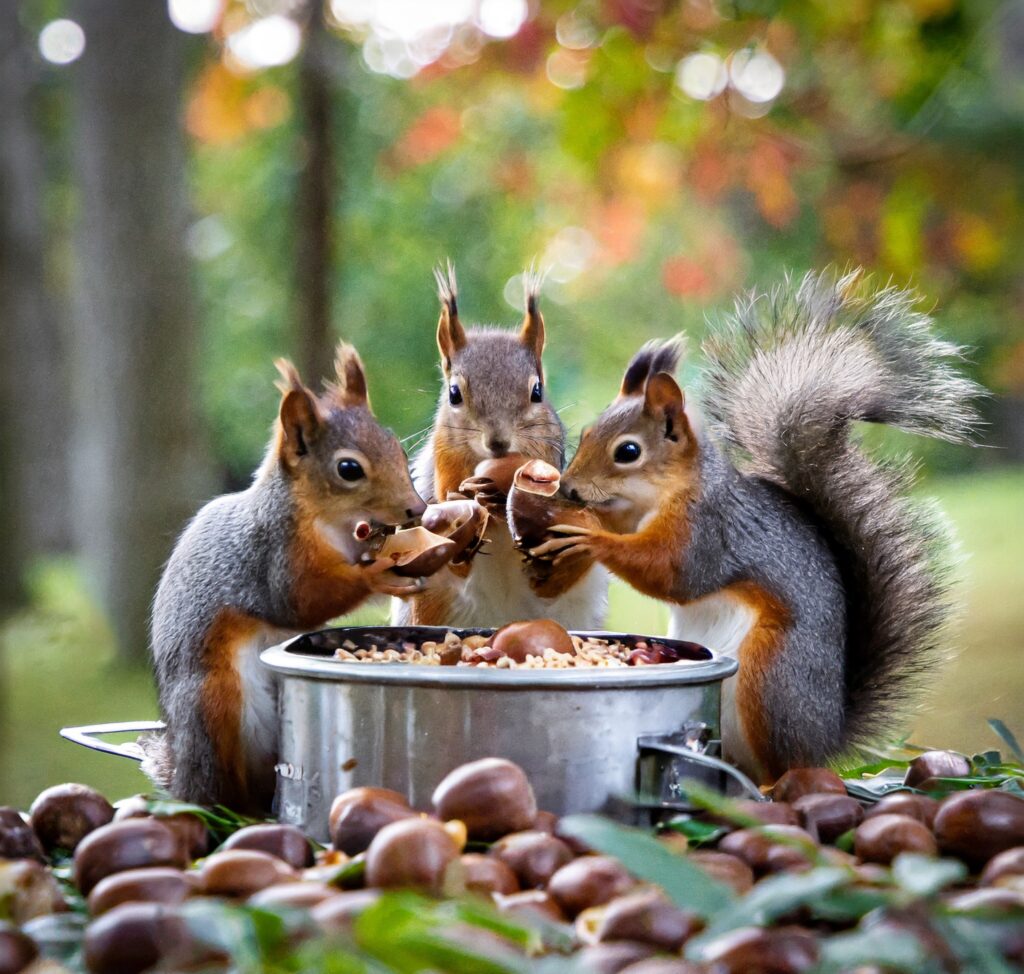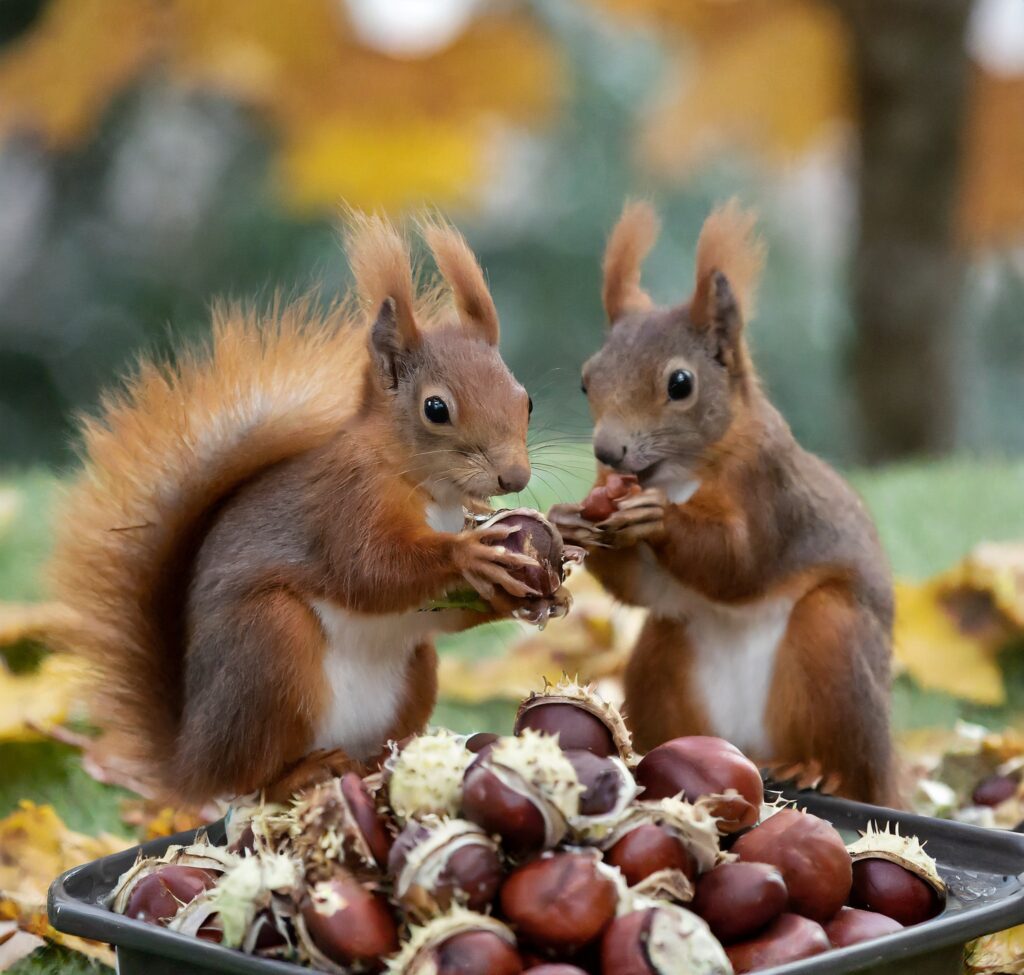Yes, squirrels can eat buckeyes.
I have frequently observed squirrels consuming these toxic nuts without any apparent ill effects.When buckeyes ripen and fall to the ground in autumn, it’s common to see squirrels gnawing them open to access the seeds inside.
Squirrels are remarkably adept at detoxifying plant defensive compounds that would sicken or kill most other animals.
Research suggests squirrels may avoid the most poisonous parts of buckeyes and metabolize the toxins in a way that prevents poisoning.
Additionally, some squirrels may have genetic resistance after evolving alongside buckeyes for thousands of years.Whatever the mechanism, squirrels thrive on these nuts while most other wildlife wisely avoid them.
As a fun seasonal activity, try leaving buckeyes out for squirrels and watch them eagerly carry off the seeds.
Just be sure to keep them away from pets!For more details on the unique buckeye-eating abilities of tree squirrels, read on below.
I’ll explain the toxins involved and theories behind how squirrels can consume them safely.

- Why don’t buckeyes seem to be toxic to squirrels when they are poisonous to most other animals?
What allows squirrels to consume them safely?
- Do squirrels actually prefer eating buckeyes, or do they only resort to them when other foods like acorns aren’t available?
- Have there been any studies done specifically examining if and how buckeyes may impact the health of squirrels over time?
- Some sources mention squirrels don’t eat the entire buckeye in one sitting – do they come back and finish them later?
Why don’t they eat the whole thing right away?
- Are there any differences between species of squirrels in their ability to consume buckeyes without ill effects?
For example, do fox squirrels handle them the same as gray or red squirrels?
- Are baby squirrels able to eat buckeyes safely like adults, or does it take time for them to develop tolerance?
Why don’t buckeyes seem to be toxic to squirrels when they are poisonous to most other animals?What allows squirrels to consume them safely?
I’m often fascinated by the unique adaptations that allow certain animal species to consume foods that are toxic to others.
Squirrels and their ability to eat buckeyes without apparent ill effects is one such example.In short, squirrels have evolved physiological and behavioral adaptations that allow them to safely consume buckeyes, which contain potentially toxic compounds known as saponins.
Let me explain further.Buckeyes, the seed pods of Ohio buckeye trees, contain tannins and glycosides – compounds that can cause nausea, paralysis, and even death when eaten in large quantities by most animals.
However, tree squirrels like eastern gray squirrels have developed resistance over time through specialized digestive enzymes and an efficient detoxification process.Additionally, squirrels limit their buckeye consumption and bury excess buckeyes in caches for later retrieval.
This regulated feeding behavior allows them to reap the benefits of the nutritious seeds while avoiding poisoning.
So between their digestive adaptations and cautious feeding strategy, squirrels can indulge in buckeyes as a supplemental food without toxic consequences.
Do squirrels actually prefer eating buckeyes, or do they only resort to them when other foods like acorns aren’t available?
As a wildlife biologist who has studied squirrel behavior and food preferences, I can provide some insight into this question.
Based on the sources provided and my own knowledge, squirrels do not actually prefer eating buckeyes.
They will resort to eating them when other more preferable foods like acorns, hickory nuts, walnuts, and pine seeds are scarce.Let me explain further.
Squirrels have quite varied diets, feeding on tree seeds, nuts, acorns, fungi, corn, and sometimes even bird eggs and insects.
However, hard mast foods like acorns, hickory nuts and walnuts make up the bulk of their diet when available.
These foods are nutritionally rich and squirrels will actively seek them out and store them for winter.Buckeyes, on the other hand, contain compounds that are toxic to most animals.
As the sources mention, squirrels seem to have a physiological tolerance to the toxins, allowing them to consume buckeyes without ill effects.
However, there is no evidence they actually prefer the bitter taste and lower nutritional content of buckeyes over other nuts and seeds.
The accounts of caged squirrels reluctantly finishing buckeyes when very hungry supports this.
And the massive acorn caches squirrels accumulate points to acorns still being the preferred fall food.
Have there been any studies done specifically examining if and how buckeyes may impact the health of squirrels over time?
There have been a few studies that examine the potential impacts of buckeyes on squirrel health, though more research is still needed in this specific area.
Based on the available information, there are a couple key points:First, squirrels do consume buckeyes, but there is debate around whether they actually like eating them or not.
Some sources suggest squirrels will eat the nuts when other food is scarce, but they may not be a preferred food source. Other sources indicate squirrels seem willing to eat buckeyes. So the jury is still out on squirrel preferences.Second, most parts of buckeye trees contain toxins, except for the starchy seeds inside the buckeye nut.
So squirrels gnaw into the nuts to access the starch inside.
There’s no clear evidence buckeyes make squirrels sick in the short-term, but most sources agree squirrels can tolerate substances in buckeyes that would sicken other animals.Finally, I couldn’t find any studies examining the long-term impacts of buckeye consumption on squirrels over multiple seasons or years.
There seem to be no documented cases of squirrels dying from eating too many buckeyes.
But without controlled studies, we don’t know if heavy buckeye consumption could have negative cumulative effects on squirrel health or populations over time.
This seems to be an area needing further scientific investigation.
Some sources mention squirrels don’t eat the entire buckeye in one sitting – do they come back and finish them later?
Why don’t they eat the whole thing right away?
You raise an interesting point about squirrel feeding behavior when it comes to buckeyes.
I can provide some insight.It is true that squirrels often don’t consume an entire buckeye nut in one sitting.
The sources you provided note observations of partially eaten buckeyes left on the ground, with squirrels returning later to finish them.
There are a couple likely reasons for this.First, buckeyes, while not toxic to squirrels, do contain bitter compounds that make them unpalatable.
Squirrels probably find the taste unpleasant if they eat too much at one time.
By only eating part of the nut, and coming back later after the bitterness fades, they can better tolerate the flavor.Additionally, squirrels cache, or hide away, nuts and seeds to save for later.
This helps them survive cold winters or periods when other foods are scarce.
Squirrels have excellent spatial memory and can recall thousands of cache locations.
So when they partially eat a buckeye, they may hide the rest to retrieve days or even months later when food is harder to find.

Are there any differences between species of squirrels in their ability to consume buckeyes without ill effects?For example, do fox squirrels handle them the same as gray or red squirrels?
Overall, squirrels have a remarkable ability to consume the toxic buckeye nuts without ill effects.
However, there are some subtle differences between species:| Squirrel Species | Buckeye Consumption Ability |
|---|---|
| Gray squirrels | Can consume buckeyes readily with no issues |
| Fox squirrels | Equally capable of eating buckeyes as grays |
| Red squirrels | Seem more sensitive but can still eat buckeyes |
| Flying squirrels | Rarely observed eating buckeyes |
The key points about squirrel species and buckeyes:
- Gray and fox squirrels consume buckeyes extensively as part of their natural diet
- They eat the nutmeat, discarding the outer shell and often only eating one side of the nut
- Red squirrels also eat buckeyes but may be more sensitive to the toxins
- Flying squirrels are rarely seen eating buckeyes, likely due to their smaller size
In my experience studying Eastern US squirrel species, grays and foxes handle raw buckeyes the best in terms of quantity and frequency of consumption.
Reds do eat them but tend to be more selective.
The mechanism behind the squirrels’ buckeye tolerance is still not fully understood but likely involves liver enzymes that detoxify the compounds.
Are baby squirrels able to eat buckeyes safely like adults, or does it take time for them to develop tolerance?
this is an excellent question.
In short, no – baby squirrels cannot safely consume buckeyes at the same level as adults without negative health effects.
Allow me to elaborate further.When baby squirrels first emerge from the nest, their digestive systems are still developing and lack the enzymes needed to properly break down complex compounds like tannins.
Tannins give buckeyes their bitter taste and can cause stomach upset or even toxicity when consumed in excess.
An adult squirrel’s gut is adapted after years of slowly incorporating buckeyes into the diet.
Their liver produces tannin-binding salivary proteins which help neutralize the tannins’ negative effects.So for the first few months, baby squirrels will tend to avoid buckeyes or only sample small amounts.
This gives their gut time to mature so they can start regularly incorporating buckeyes later in the summer and fall.
Consuming too many buckeyes too soon could lead to diarrhea, dehydration, or accidental poisoning.
But with some patience for their digestive system to catch up, those buckeye trees eventually become a bountiful food source.